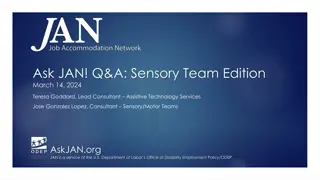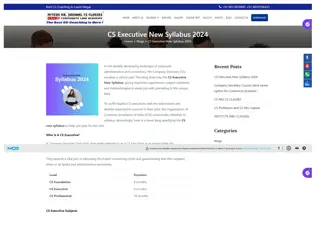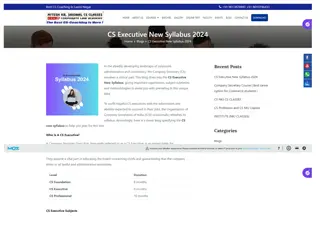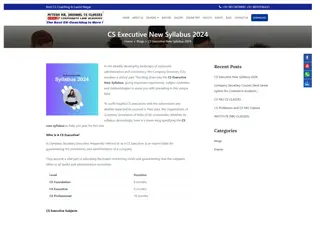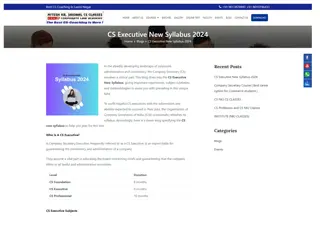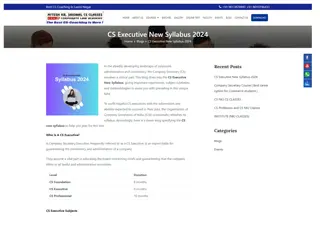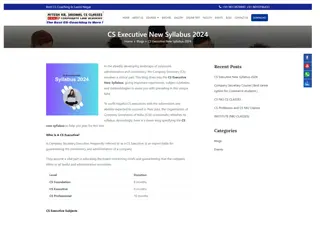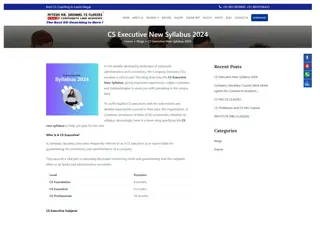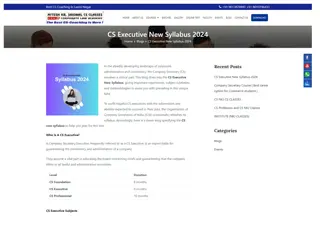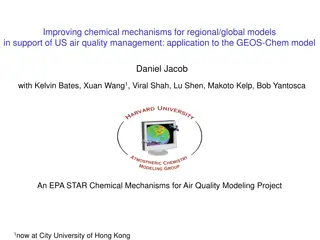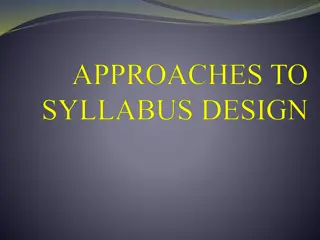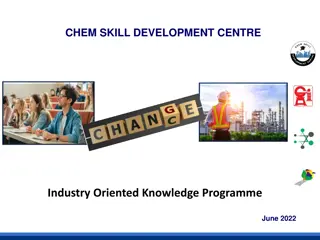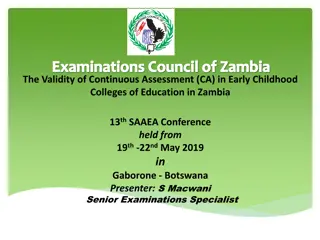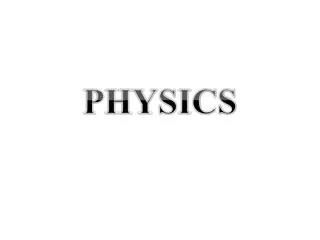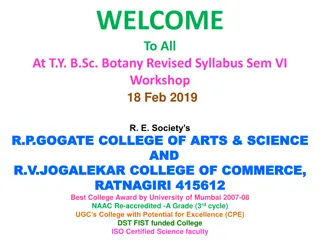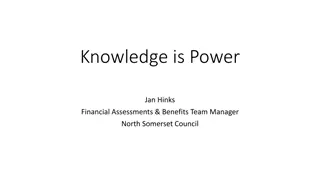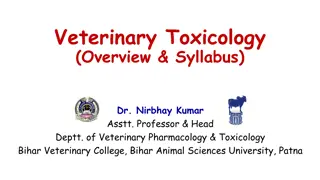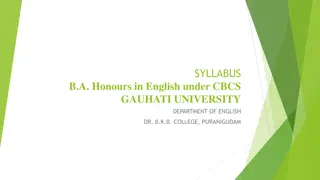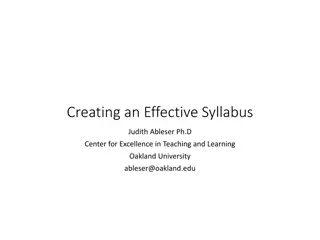
Chemistry in Practice (ChIP) for the 21st Century - Course Information and Details
Explore Chemistry in Practice (ChIP) for the 21st Century with Professor Jeff Smith. This course focuses on sustainability, green chemistry, industrial chemistry, and more. Find information on lectures, evaluations, and academic accommodations. Join a comprehensive study of the chemical industry's latest developments and environmental protections.
Download Presentation

Please find below an Image/Link to download the presentation.
The content on the website is provided AS IS for your information and personal use only. It may not be sold, licensed, or shared on other websites without obtaining consent from the author. If you encounter any issues during the download, it is possible that the publisher has removed the file from their server.
You are allowed to download the files provided on this website for personal or commercial use, subject to the condition that they are used lawfully. All files are the property of their respective owners.
The content on the website is provided AS IS for your information and personal use only. It may not be sold, licensed, or shared on other websites without obtaining consent from the author.
E N D
Presentation Transcript
CHEM 3701 Winter 2024 Instructor: Professor Jeff Smith Office: Steacie 225 Phone: (613) 520-2600 ext.2408 E-mail: jeff.smith@carleton.ca @profjeffsmith Lectures: Tuesdays, 2:35pm - 5:25pm Steacie 115 Textbook: None. Electronic PDF files will be distributed as needed. Course website: Brightspace will be used. Please visit Brightspace (https://carleton.ca/brightspace/) for course announcements, lecture notes and assignments. Office hours: Email is the best way to get a hold of me to make an appointment.
CHEM 3701 Winter 2024 Instructor: Professor Jeff Smith Office: Steacie 225 Phone: (613) 520-2600 ext.2408 E-mail: jeff.smith@carleton.ca @profjeffsmith CHEM 3701 [0.5 credit] Chemistry in Practice (ChIP) for the 21st Century Students explore different sectors of chemical industry; developments in sustainability; principles, analytical frameworks, and applications of green chemistry; environmental protections; and Canadian regulatory frameworks. Students investigate novel issues in industrial chemistry, build scientific literacy skills, and practice communicating scientific information to diverse audiences.
Evaluation: 1) Written assignments a) Short formal review article b) Lay abstract c) Briefing note 2) Oral presentations a) 20 min oral presentation b) 3 minute thesis (TMT) c) 30 second elevator pitch to two different audiences 3) Final Exam (open book) Grading: The final grade for CHEM 3701 will be based on the following: Written Assignments* Oral Presentations* Final exam Total: 40% 40% 20% 100% * - distribution of marks within these will be divided equally between the sub-components
Fine print: Academic Accommodation for Students with Disabilities: Carleton University is strongly committed to providing access and accommodation for all individuals with identified and duly assessed disabilities. The University has a Senate-approved policy on Academic Accommodation that forms part of its Human Rights Policy. This policy should be consulted for further information and is available at the front of this Calendar and online at: www.carleton.ca/equity. The policy promotes efforts to accommodate students with disabilities so that they will have the opportunity to meet learning objectives and be fairly evaluated in their performance. In no case, however, does academic accommodation negotiate away, lower, or remove the academic standards and learning objectives of any course or program, rule, regulation, or policy at the University. The Paul Menton Centre for Students with Disabilities (www.carleton.ca/pmc/) is the designated unit at the University for assisting the Carleton community in integrating persons with disabilities into all aspects of Carleton's academic and community life. The Paul Menton Centre provides assessment of academic accommodation, advises students on strategies to open a dialogue with instructors and acts as consultant, facilitator, coordinator and advocate in this area for all members of the University community. The Paul Menton Centre provides individualized support services, based on appropriate and up to date documentation, to persons who are deaf or hard of hearing, with learning disabilities, attention deficit disorder (ADD), visual impairments, head injuries, physical disabilities including mobility impairments, or who have psychiatric, other medical or non-visible disabilities. Students are responsible for applying for special services by making an appointment with the appropriate coordinator at the Paul Menton Centre. All requests will be considered on the basis of individual need. Students are advised to come to the Centre early in the term to discuss service requests. Examination accommodations for all tests and examinations (in-class, CUTV, or formally scheduled) must be arranged by specific deadline dates. Please consult the Paul Menton Centre for a list of deadlines for all examinations. Accommodation requests not made prior to the specified deadlines will not be fulfilled. Students with disabilities requiring academic accommodations in this course must register with the Paul Menton Centre for Students with Disabilities for a formal evaluation of disability-related needs. Registered PMC students are required to contact the centre, 613-520-6608, every term to ensure that I receive your letter of accommodation, no later than two weeks before the first assignment is due or the first in-class test/midterm requiring accommodations. If you require accommodation for your formally scheduled exam(s) in this course, please submit your request for accommodation to PMC by November 7, 2008, for December examinations, and March 6, 2009, for April examinations. Academic Accommodation for Students with Religious Obligations: Carleton University accommodates students who, due to religious obligation, must miss an examination, test, assignment deadline, laboratory, or other compulsory event. The University has a Senate-approved policy on religious accommodation that forms part of its Human Rights Policy, available at: www.carleton.ca/equity. Students requesting academic accommodation on the basis of religious observance should make a formal, written request to their instructors for alternate dates and/or means of satisfying academic requirements. Such requests should be made during the first two weeks of class, or as soon as possible after the need for accommodation is known to exist, but no later than two weeks before the compulsory academic event. Accommodation is to be worked out directly and on an individual basis between the student and the instructor(s) involved. Instructors will make accommodations in a way that avoids academic disadvantage to the student. Students or instructors who have questions or want to confirm accommodation eligibility of a religious event or practice may refer to the Equity Services website for a list of holy days and Carleton's Academic Accommodation policies, or may contact an Equity Services Advisor in the Equity Services Department for assistance. Students unable to reach a satisfactory arrangement with their instructor(s) should contact the Director of Equity Services. Instructors who have questions or wish to verify the nature of the religious event or practice involved should also contact this officer.
Fine print (cont): Academic Accommodation for Pregnant Students: Pregnant students requiring academic accommodations are encouraged to contact an Equity Advisor in Equity Services to complete a letter of accommodation. The student must then make an appointment to discuss her needs with the instructor at least two weeks prior to the first academic event in which it is anticipated the accommodation will be required. Student Conduct: The University has adopted a policy to deal with allegations of academic misconduct. This policy is expressed in the document Carleton University Academic Integrity Policy, effective July 1, 2006. The policy describes in detail its scope of application, principles, definitions, rights and responsibilities, academic integrity standards, procedures, sanctions, transcript notations, appeal process, and records implications. The complete policy is available at: www.carleton.ca/studentsupport or www.carleton.ca/studentaffairs Plagiarism: Plagiarism is presenting, whether intentional or not, the ideas, expression of ideas or work of others as one's own. Plagiarism includes reproducing or paraphrasing portions of someone else's published or unpublished material, regardless of the source, and presenting these as one's own without proper citation or reference to the original source. Examples of sources from which the ideas, expressions of ideas or works of others may be drawn from include but are not limited to: books, articles, papers, literary compositions and phrases, performance compositions, chemical compounds, art works, laboratory reports, research results, calculations and the results of calculations, diagrams, constructions, computer reports, computer code/software, and material on the Internet. Examples of plagiarism include, but are not limited to: submitting a take-home examination, essay, laboratory report or other assignment written, in whole or in part, by someone else; using ideas or direct, verbatim quotations, paraphrased material, algorithms, formulae, scientific or mathematical concepts, or ideas without appropriate acknowledgment in any academic assignment; using another's data or research findings; submitting a computer program developed in whole or in part by someone else, with or without modifications, as one's own; failing to acknowledge sources through the use of proper citations when using another s works and/or failing to use quotation marks. For more information, see: https://carleton.ca/registrar/academic-integrity/
You may need special arrangements to meet your academic obligations during the term. For an accommodation request the processes are as follows: Pregnancy obligation: write to me with any requests for academic accommodation during the first two weeks of class, or as soon as possible after the need for accommodation is known to exist. For more details visit the Equity Services website: http://www2.carleton.ca/equity/ Religious obligation: write to me with any requests for academic accommodation during the first two weeks of class, or as soon as possible after the need for accommodation is known to exist. For more details visit the Equity Services website: http://www2.carleton.ca/equity/ Academic Accommodations for Students with Disabilities: The Paul Menton Centre for Students with Disabilities (PMC) provides services to students with Learning Disabilities (LD), psychiatric/mental health disabilities, Attention Deficit Hyperactivity Disorder (ADHD), Autism Spectrum Disorders (ASD), chronic medical conditions, and impairments in mobility, hearing, and vision. If you have a disability requiring academic accommodations in this course, please contact PMC at 613-520-6608 or pmc@carleton.ca for a formal evaluation. If you are already registered with the PMC, contact your PMC coordinator to send me your Letter of Accommodation at the beginning of the term, and no later than two weeks before the first in-class scheduled test or exam requiring accommodation (if applicable). After requesting accommodation from PMC, meet with me to ensure accommodation arrangements are made. Please consult the PMC website for the deadline to request accommodations for the formally-scheduled exam (if applicable) at http://www2.carleton.ca/pmc/new-and-current- students/dates-and-deadlines/ You can visit the Equity Services website to view the policies and to obtain more detailed information on academic accommodation at http://www2.carleton.ca/equity/
Academic Integrity: Minimum penalties for offences starting January 6th, 2020 First offence, first-year students (< 4.0 cr): Final grade reduction of one full grade (e.g., A- becomes a B-, if that results in an F, so be it) First offence (everyone else): F in the course Second offence: One-year suspension from program Third offence: Expulsion from the University Note: these are minimum penalties. More-severe penalties will be applied in cases of egregious offences (e.g., a first-year student accessing Brightspace from their phone during an exam will be given an F in the course; bribing a faculty member for a better grade would be grounds for suspension, etc.)
CHEM 3701 Learning Outcomes: 1. Propose viable solutions to complex societal problems in an interdisciplinary fashion using industrial chemistry 2. Evaluate the societal, economic and environmental impacts of reagents and products in industrial chemistry reactions and propose sustainable alternatives where appropriate 3. Apply scientific literacy skills to find and use scientific literature 4. Communicate chemistry findings to experts and non-experts through reports, presentations, and other written and oral formats 5. Demonstrate a commitment to the principles of equity, diversity, and inclusion in industrial chemistry 6. Navigate Canadian regulations relevant to the industrial application chemistry
Tentative Lecture Schedule** # Lecture Topics Reading Presentation / discussion of syllabus Tips for success Introductory discussion, topical overview of course Jan 9th, 2024 1 N/A N/A See Brightspace Guest speaker #1 ChIP: Manufacturing Industry Chelsey Aulenback Associate Scientist at Dr. Robert Ben - Chief Scientific Officer of PanTHERA CryoSolutions Discussion of formal review articles Jan 16th, 2024 2 See Brightspace Genomadix Inc Guest speaker #2 ChIP: Scientific and Technical Sales Maria Garrett Account Manager at Agilent Technologies, Inc Madeleine Tesson Account Manager Jan 23rd, 2024 3 See Brightspace Chemistries and Supplies at Agilent Technologies, Inc Discussion of lay abstract ** Lecture and course schedule is subject to change at the discretion of Professor Smith
Tentative Lecture Schedule** # Lecture Topics Reading Guest speaker #3 Chip: Public Policy and Regulatory Environments Jennifer Czerneda - Senior Advisor, Central Fiona Cornel - Manager, Biotherapeutics Quality Division 1, Centre for Oncology, Radiopharmaceuticals and Research, Biologic and Radiopharmaceutical Drugs Directorate, Health Canada Discussion of briefing note Jan 30th, 2024 4 See Brightspace Agencies, Government Operations Sector Treasury Board of Canada Secretariat / Government of Canada ** Lecture and course schedule is subject to change at the discretion of Professor Smith
Tentative Lecture Schedule** # Lecture Topics Reading Guest speaker #4 ChIP: Forensics and Law Enforcement Environments Dr. Nigel Hearns - Program Technical Leader Trace Evidence (chemistry) RCMP National Forensic Laboratory Services Discuss 20 min oral presentation Feb 6th, 2024 5 See Brightspace Field Trip #1 Canada Border Services Agency Feb 13th, 2024 6 See Brightspace READING WEEK Feb 20th, 2024 Guest speaker #5 ChIP: Legal aspects of chemical industry, intellectual property issues Terry Diduch - Chemical Patent Examination Division, Canadian Intellectual Property Office Andrea Pitts - Partner, Borden Ladner Gervais Discuss 3 minute thesis (TMT) Feb 27th, 2024 7 See Brightspace ** Lecture and course schedule is subject to change at the discretion of Professor Smith
Tentative Lecture Schedule** # Lecture Topics Reading Field Trip #2 National Research Council of Canada Mar 5th, 2024 8 See Brightspace Guest speaker #6 ChIP: Industrial Environmental Health and Safety and the Interface Between the Industrial, Academic and Policy Worlds Zaneta Polis - Manager, Environmental Health and Safety, Office of Risk Management, Carleton University Jeffrey Manthorpe Professor, Department of Mar 12th, 2024 9 See Brightspace Chemistry, Carleton University ** Lecture and course schedule is subject to change at the discretion of Professor Smith
Tentative Lecture Schedule** # Lecture Topics Reading 20 min presentations, 5 mins of feedback 2:40 3:10pm Angela Radnoff - Remediation of PFAS in wastewater by the use of different adsorption methods 3:10 3:40pm Pallavi Jaiprakash Green Chemistry 3:40 4:10pm Jake Edgley Citizen Science 4:10 4:40pm Fatuma Yusuf Chemical Insights into Nutrient Analysis 4:40 5:10pm Kaelyn Barkley Biological effects of different foods Review article due Mar 19th, 2024 10 See Brightspace 20 min presentations, 5 mins of feedback 2:40 3:10pm Mikayla Clarke Chemistry of skincare 3:10 3:40pm Rachel Parson - Ozone Chemistry and Modelling in Old Growth Forest Canopy Layers 3:40 4:10pm Owen Xing Regulation of food Lay abstract due Mar 26th, 2024 11 See Brightspace ** Lecture and course schedule is subject to change at the discretion of Professor Smith
Tentative Lecture Schedule** # Lecture Topics Reading 3 minute thesis (TMT) talks Angela Radnoff - Remediation of PFAS in wastewater by the use of different adsorption methods Owen Xing Regulation of food Jake Edgley Citizen Science Fatuma Yusuf Chemical Insights into Nutrient Analysis Kaelyn Barkley - Biological effects of different foods Pallavi Jaiprakash Green Chemistry Mikayla Clarke Chemistry of skincare Rachel Parson - Ozone Chemistry and Modelling in Old Growth Forest Canopy Layers Briefing note due Apr 2nd, 2024 12 See Brightspace ** Lecture and course schedule is subject to change at the discretion of Professor Smith
Tentative Lecture Schedule** # Lecture Topics Reading 30 sec presentations to different audiences Jake Edgley Citizen Science Owen Xing Regulation of food Fatuma Yusuf Chemical Insights into Nutrient Analysis Rachel Parson - Ozone Chemistry and Modelling in Old Growth Forest Canopy Layers Angela Radnoff - Remediation of PFAS in wastewater by the use of different adsorption methods Mikayla Clarke Chemistry of skincare Pallavi Jaiprakash Green Chemistry Kaelyn Barkley - Biological effects of different foods Final take home open book exam assigned Apr 9th, 2024 13 See Brightspace Take home exam due Apr 25th, 2024 ** Lecture and course schedule is subject to change at the discretion of Professor Smith


